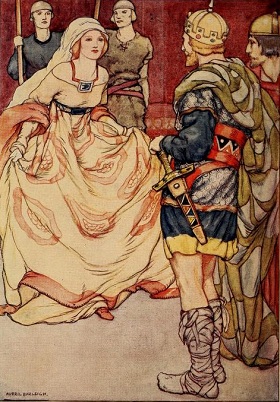|
|
Macbeth Glossary
Thou'dst have...be undone. (1.5.24-6)
Thus thou must do, if thou have it;
And that which rather thou dost fear to do
Than wishest should be undone.
This passage is one of the most misunderstood in all of Shakespeare's works. The best explanation I have encountered comes from editor Kenneth Muir:
The chief difficulty here is the extent of the quotation. Pope put the whole passage in inverted commas [British name for quotation marks], and he has been followed by most editors (i.e., "Thus...undone"). Hanmer, Capell, Verity, Wilson and others end the quotation at the end of line 23. Hunter (Illustrations, ii. 172) only marks "Thus thou must do" as such. I think he is right, because that which cries is the crown, and if "it" were part of the quotation one would expect "me" instead. As Verity explains, "thou'ldst have" has two objects, the crown and the murder by which the crown may be obtained (24-5)." (Shakespeare, William. Macbeth. Kenneth Muir, ed. London. Methuen, 1953. [p.p.28])
For more on this passage please see the annotations at the bottom of the main page of Macbeth 1.5
How to cite this article:
Mabillard, Amanda. Macbeth Glossary. Shakespeare Online. 20 Aug. 2000. (date when you accessed the information) < http://www.shakespeare-online.com/plays/macbeth/macbethglossary/macbeth1_1/macbethglos_beundone.html >.
______
Related Articles
 Macbeth: The Complete Play with Annotations and Commentary Macbeth: The Complete Play with Annotations and Commentary
 Explanatory Notes for Lady Macbeth's Soliloquy (1.5) Explanatory Notes for Lady Macbeth's Soliloquy (1.5)
 The Psychoanalysis of Lady Macbeth (Sleepwalking Scene) The Psychoanalysis of Lady Macbeth (Sleepwalking Scene)
 Lady Macbeth's Suicide Lady Macbeth's Suicide
 Is Lady Macbeth's Swoon Real? Is Lady Macbeth's Swoon Real?
 James I and Shakespeare's Sources for Macbeth James I and Shakespeare's Sources for Macbeth
 Contemporary References to King James I in Macbeth (1605-06) Contemporary References to King James I in Macbeth (1605-06)
 The Metre of Macbeth: Blank Verse and Rhymed Lines The Metre of Macbeth: Blank Verse and Rhymed Lines
 Macbeth Character Introduction Macbeth Character Introduction
 Metaphors in Macbeth (Biblical) Metaphors in Macbeth (Biblical)
 Soliloquy Analysis: If it were done when 'tis done (1.7.1-29) Soliloquy Analysis: If it were done when 'tis done (1.7.1-29)
 Soliloquy Analysis: Is this a dagger (2.1.33-61) Soliloquy Analysis: Is this a dagger (2.1.33-61)
 Soliloquy Analysis: To be thus is nothing (3.1.47-71) Soliloquy Analysis: To be thus is nothing (3.1.47-71)
 Soliloquy Analysis: She should have died hereafter (5.5.17-28) Soliloquy Analysis: She should have died hereafter (5.5.17-28)
 Explanatory Notes for the Witches' Chants (4.1) Explanatory Notes for the Witches' Chants (4.1)
 Macbeth Plot Summary (Acts 1 and 2) Macbeth Plot Summary (Acts 1 and 2)
 Macbeth Plot Summary (Acts 3, 4 and 5) Macbeth Plot Summary (Acts 3, 4 and 5)
 A Comparison of Macbeth and Hamlet A Comparison of Macbeth and Hamlet
 The Effect of Lady Macbeth's Death on Macbeth The Effect of Lady Macbeth's Death on Macbeth
 The Curse of Macbeth The Curse of Macbeth
 Macbeth Q & A Macbeth Q & A
 Aesthetic Examination Questions on Macbeth Aesthetic Examination Questions on Macbeth
 What is Tragic Irony? What is Tragic Irony?
 Macbeth Study Quiz (with detailed answers) Macbeth Study Quiz (with detailed answers)
 Quotations from Macbeth (Full) Quotations from Macbeth (Full)
 Top 10 Quotations from Macbeth Top 10 Quotations from Macbeth
 Characteristics of Elizabethan Tragedy Characteristics of Elizabethan Tragedy
 Shakespeare's Workmanship: Crafting a Sympathetic Macbeth Shakespeare's Workmanship: Crafting a Sympathetic Macbeth
 Temptation, Sin, Retribution: Lecture Notes on Macbeth Temptation, Sin, Retribution: Lecture Notes on Macbeth
 Untie the winds: Exploring the Witches' Control Over Nature in Macbeth Untie the winds: Exploring the Witches' Control Over Nature in Macbeth
 Why Shakespeare is so Important Why Shakespeare is so Important
 Shakespeare's Language Shakespeare's Language
 Shakespeare's Influence on Other Writers Shakespeare's Influence on Other Writers
|

|
|